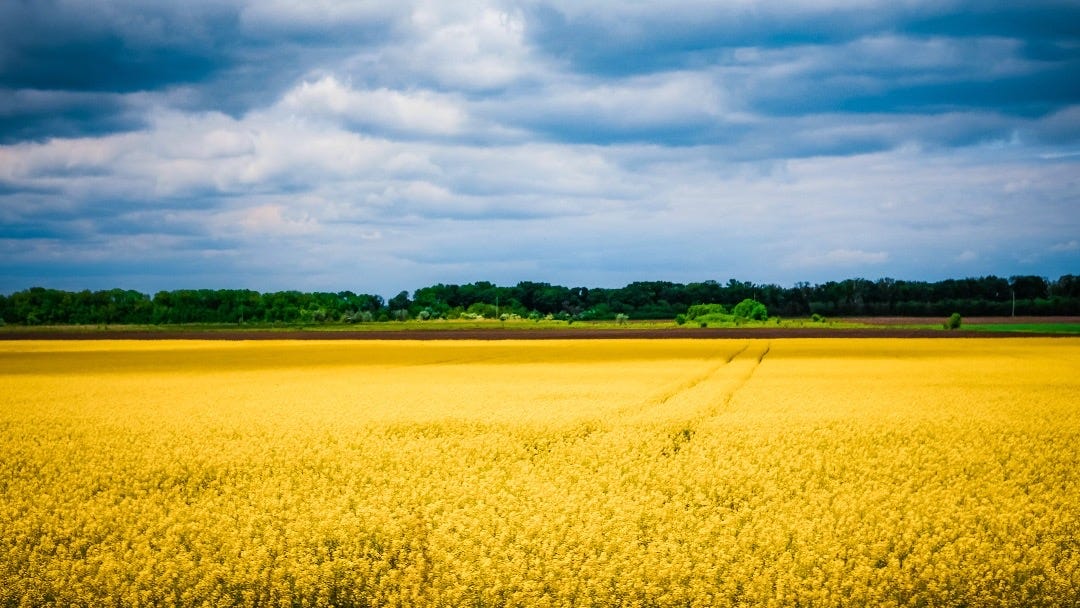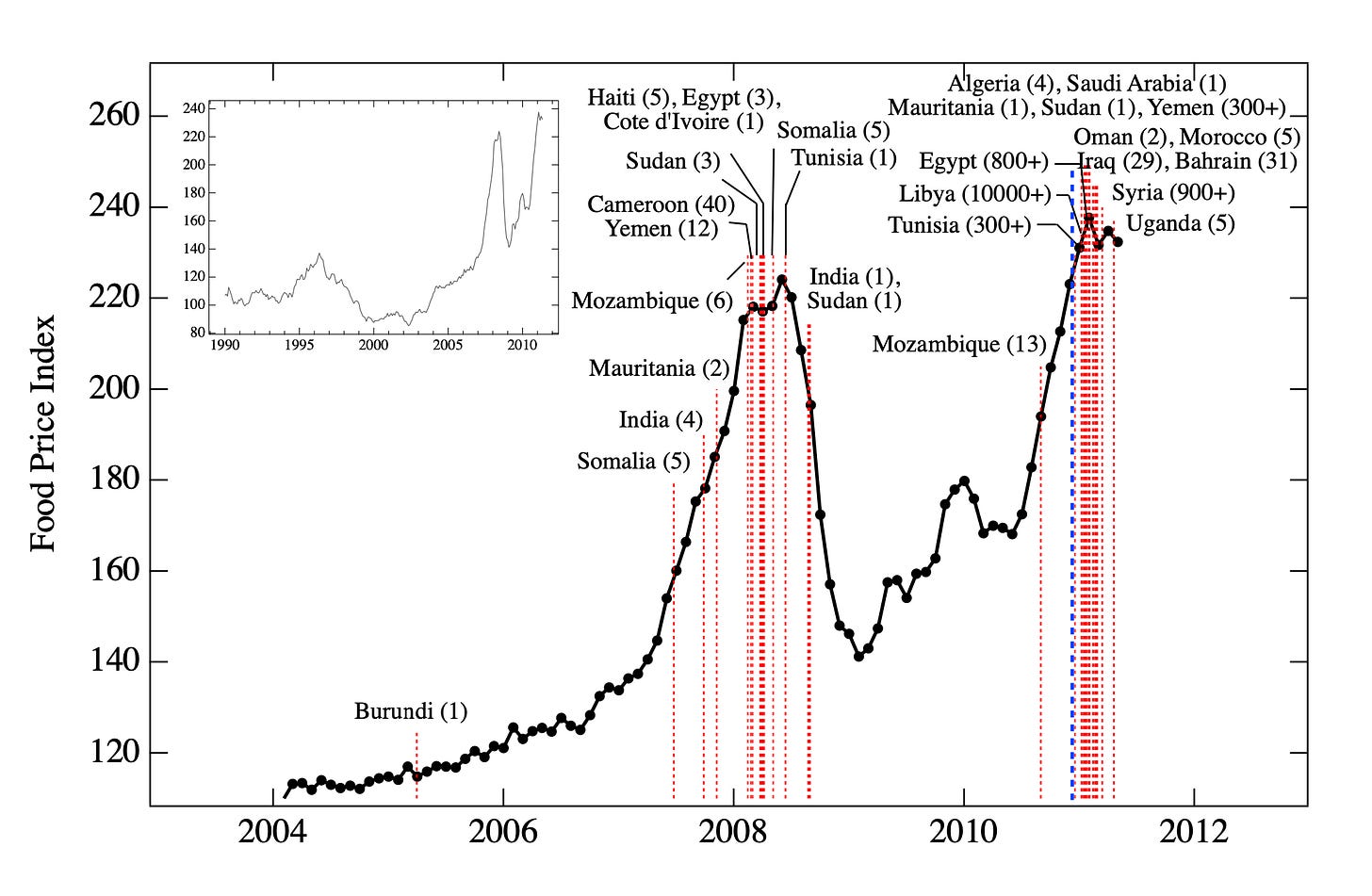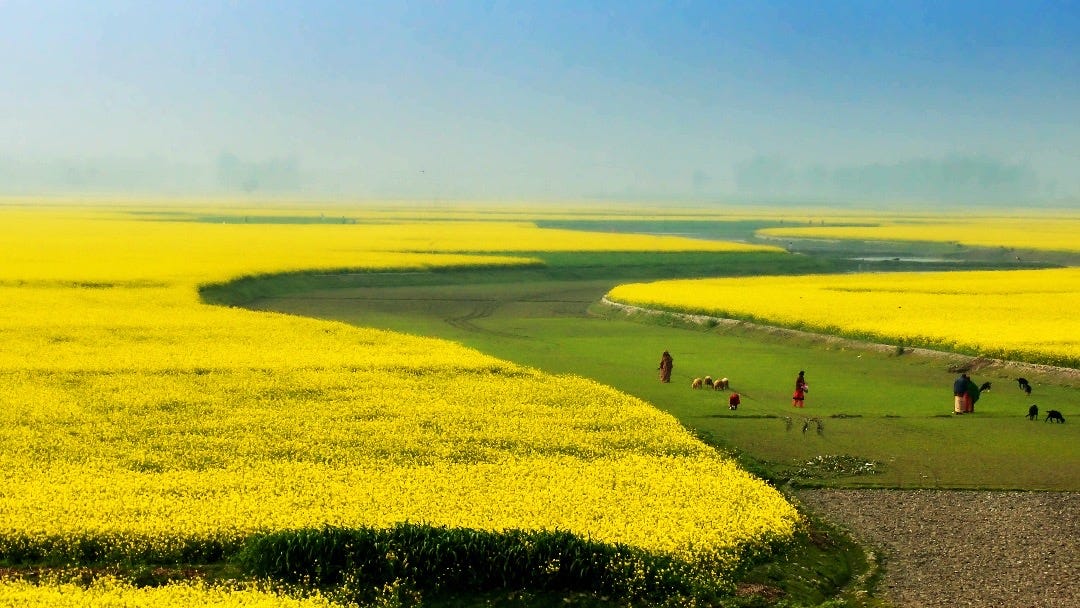The War in Ukraine Threatens Global Food Security
Russia and Ukraine are leading exporters of wheat and barley: looking at the relationship between food prices and conflict.

We will never know if Marie-Antoinette ever said: "Let them eat cake," when she was informed that the hungry French people had no more bread to eat. Historians believe it is unlikely. Marie-Antoinette donated generously to charitable causes and displayed sensitivity towards the poor; such a remark would have been uncharacteristic of her. The "let them eat cake"-story was by the time of the French Revolution already over a century old, and several French royals have been blamed for making this remark. Jean-Jacques Rousseau used the statement already in his writing some 25 years before the revolution.
But it illustrates the relationship between food and conflict. Hunger may trigger uprisings or war that may lead to further food shortages. Last week, protests erupted in Iraq's impoverished south over a rise in food prices, and officials attributed these to the war in Ukraine. We may see more of this in the months to come.
In 2011, Marco Lagi and others looked into the relationship between food crises and political instability in North Africa and the Middle East. The then-called Arab Spring of uprisings all over the region was just a few months earlier and had started in late 2010 with the suicide of a Tunisian food vendor. The study found many possible causes for social unrest, like poverty, unemployment, or social injustice. However, one possible reason was remarkable; the timing of violent protests in North Africa and the Middle East in 2011 and earlier riots in 2008 coincided with significant peaks in global food prices. This is a graph from their article:
They don't claim a one-on-one relationship; it is easy to find examples of hungry populations in regions without conflict (for example, the current food crisis in Madagascar). But the pattern they found suggests that protests may reflect not only long-standing political failings of governments but also the sudden desperate straits of vulnerable populations.
The graph is as convincing as the Roman poet Juvenal's remark about the importance of "bread and circuses" to gain power. However, the relationship still remains a source of considerable debate. Two years after the article was published, the New Security Beat wrote: "Prognostications like these are dangerous because they are overly simplistic and reductionist, potentially leading to a policy that doesn't address the actual problem and can even make things worse. The correlation between FAO Food Price Index levels and conflict does not hold up under close scrutiny – local prices do not necessarily respond immediately to changes in the Index, and it's hard to determine what constitutes a food riot or if other factors besides food prices are having a larger impact in a restive society".
The breadbasket of Europe
The relationship works both ways. Lack of food can lead to social unrest, yet a conflict has often induced food insecurity. Gaining access to another country's land and water for food production has, throughout history, often been a source of war. Future historians will likely argue to what extent Putin's invasion of Ukraine may have been motivated by food security. Ukraine was often known as the breadbasket of Europe, and according to the CIA World Factbook, Ukraine produced 25 percent of all agricultural output in the former Soviet Union. There is never one cause for war, and food security doesn't seem to be his motivation for the invasion, but it may have played a role for him.
Continuing on the international aspects of the food-conflict relationship, the near future looks bleak. Hunger was already rising in the past few years; globally, 161 million more people are now suffering from hunger than before the pandemic, totaling 821 million. Last week, Gabriel Ferrero de Loma-Osorio, head of the Committee on World Food Security, warned that Russia's invasion of Ukraine heavily impacted the availability and prices of food. Russia and Ukraine combine for nearly a third of the world's wheat and barley exports. Ukraine also is a major supplier of corn and the global leader in sunflower oil used in food processing. Compared to a week before the invasion, wheat prices have now surged by 55 percent. Food prices were already at their highest levels since 2011, and now the war may reduce food supplies.
Rising food prices are one of the global impacts of the war in Ukraine. Bangladesh, for instance, imports almost half its wheat from Ukraine and Russia. I recently wrote about the compounded risks of several global crises; to stay with the example of Bangladesh: the delta nation is one of the worst victims of climate change, with millions under threat of losing homes and land because of a rise in sea levels and salinity. Every day, thousands of people pack their belongings and leave the coast for an uncertain future in the country's capital Dhaka.
Besides the impact of food shortages on global food prices, the Ukraine conflict also risks a lack of focus on other problems in the world. I'm sure you are aware of the situation in Ukraine but have you, for instance, heard about the current situation in Somalia? I guess you haven't, nor will your country's leaders because they are too distracted by the war in Ukraine. But four million people are at risk of starvation, and according to the United Nations, the situation is "deteriorating rapidly." After three years of little or no rain, the food situation was already grim, especially since crises like those in Tigray, Yemen, Afghanistan also needed attention. But according to Adam Abdelmoula, UN humanitarian coordinator for Somalia, "Now Ukraine seems to suck all the oxygen that is in the room."
Conflicts often lead to food shortages, which often lead to further conflicts. As a result, many people, institutions, and governments worldwide work intensively to break this deadly cycle. But, unfortunately, others choose to kick this wheel of unfortune without caring for a second for the human consequences of their actions in the country they invade or elsewhere on the planet.
I write these newsletters because I believe that together we can do better on this beautiful but fragile planet.
If you are a paying subscriber: thank you for your support!
Please consider supporting this initiative by taking a paid subscription if you are not. Writing is my job, I can write (and podcast) independently because of your support.
If the cost of this newsletter ($6/month, $60/year) would create any financial strain, please stay on the free list; I value all readers.
Notes:
https://www.history.com/news/did-marie-antoinette-really-say-let-them-eat-cake
https://arxiv.org/PS_cache/arxiv/pdf/1108/1108.2455v1.pdf
https://web.worldbank.org/archive/website01306/web/food%20security.html
https://www.aljazeera.com/news/2022/3/9/iraq-protest-food-prices-russia-ukraine-war
Photo 1: Olga Subach on Unsplash
Photo 2: manzur alam on Unsplash








Absolutely, there is no care for "the consequences of their actions in the country they invade or elsewhere on the planet." Oligarchs are insulated and overfed. On top of war, Putin's ban on grain exports to Russia's Caucasus "allies," for example, adds to global food insecurity.
RE. Somalia, @MichaelSctMoore has written quite a lot on food insecurity there, including domestic market disruptions furthered by "humanitarian relief."
What do you think about promoting local farmers' markets in the places that have them? Traditionally, their products are grown in unsubsidized farms, and so the produce is more expensive. But to my limited knowledge, it seems reasonable to produce locally as much as possible.
I’ve been trying to post a comment, but am having trouble finding something to say that isn’t terribly depressing. It’s so sad to me to see all the death & destruction when we should be making the world a better place. Thank you for bringing attention to this additional issue that is not emphasized enough when discussing the war.